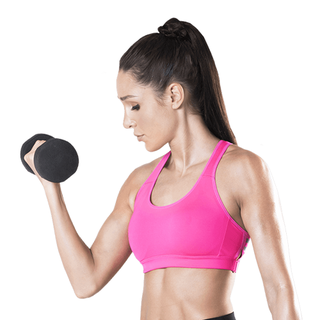How To Listen To Your Body

September 4, 2019

Learning to listen to your body is an important part of having a healthy mindset when it comes to exercise, nutrition and life.
Listening to your body helps you to know when to push harder, when to rest, and when you might need to make changes to your nutrition.
What does listening to your body mean?
Listening to your body means taking the time to assess how your body responds to things like exercise and the food you eat.
It can be so easy to get caught up in our busy day-to-day lives that we often forget to pause and reflect on how we are actually feeling.
Have you ever felt like giving up on your fitness routine after having a tough day or week? Listening to your body carefully when starting a new health fitness routine can help prevent you from getting to that point!
Tips to listen to your body
Here are some tips for listening to your body:

1. Keep a journal
Keeping a journal can help you to become aware of how your body is feeling and identify what you can do to feel your best.
Some things you can keep track of include the quality and amount of sleep you get, how you feel after eating certain foods, and how you feel after completing certain types of exercise.
Write down what you want to do to take care of yourself today. It can be something small, like getting in some extra movement every hour of your workday, planning to drink plenty of water, or getting enough sleep each night!
2. Enjoy your food
If you're like me, family traditions and events often revolve around meals — food brings us together! I believe food is to be enjoyed and sharing meals is an important part of spending time with those closest to me.
If you're trying to eat healthily, but you find you don't enjoy the food you're making, it may become harder to stick to in the long term. So it's important to eat the foods you love — healthy eating and cooking nutritious food should never feel like a chore and there are lots of ways to make simple, healthy versions of your favourite dishes. I often get questions from women about eating too much on special occasions, and my advice is you shouldn't let it worry you. If you are concerned about there not being enough healthy options available at special events or family dinners, I would say enjoy yourself. It's important to connect with those close to you, and being too restrictive is unrealistic — occasional treats or one day of eating more than you need won't make a difference to your health and fitness progress in the long-term. Focus on healthy eating afterwards, but you shouldn't feel guilty about enjoying food, even if you feel like you've overeaten every now and then. It's all about balance!
I also think having educating yourself on the nutritional value of carbohydrates, fats and proteins can also help you to enjoy your food more. Having greater knowledge of nutrition can help you to understand which foods give you the right macronutrients and micronutrients you need to feel good, train at your best and help you to stick to healthy eating in the long-term.
3. Make time for yourself
A self-care practice can help you to tune into your body. If you follow me on social media and have tried my programs, you might already know that rest and rehabilitation are just as important as training hard! Making yourself a priority for a few minutes each day can help you to connect to how you feel and make choices that benefit your overall wellbeing.
It doesn’t need to be for hours at a time — try just five or 10 minutes on busy days! You could use this time to do a foam rolling session or spend a few minutes outdoors. My programs in the Sweat app contain dedicated stretching sessions, where I guide you through each movement and help you to bring your heart rate back down to a resting rate after a tough workout.
4. Meditate
Meditation and yoga are two practices that many people find calming and can help with self-care, too!
It can be as simple as taking some deep, steady breaths and becoming aware of your body.
Meditation can also help to reduce stress levels and clear your mind.
5. Be aware of how you react to stress
When you understand how your body reacts to stress, it can be easier to take action to minimise the effect it can have on you.
It's not always possible to avoid stress but you can try to become more aware of your stress symptoms, with a view to helping alleviate their impact. For instance, you might notice that your breathing becomes shallower, the muscles in your neck and shoulders get tight, or you just generally feel tense. When you recognise your physical reaction to stressors, you can try a few different things to reduce these symptoms — exercise, stretching, connecting with friends — to see what works for you. If you find that you are facing more severe symptoms of stress, it's always a good idea to speak with a healthcare professional.
6. Notice how your body responds to exercise
Focussing on your breath with each movement and learning when to inhale and exhale, can help you connect with your body in the moment.
Listen to your body by checking how it responds to a particular exercise — do you have more energy, greater flexibility or more strength? When you notice how you feel better after exercise, it can motivate you to continue working out!
7. Think about what you need
Consider what your body really needs — this can help you to break bad habits and make healthier choices.
For example, you might be feeling sluggish and decide you need a mid-afternoon coffee. Take a moment to stop and think about how you feel and WHY — have you had enough water or food that day? These are all questions I recommend you ask yourself regularly so you know what it is your body actually needs. Try drinking some water, or consider whether eating a healthy snack will keep your body fuelled. If you find that you're regularly suffering from fatigue, you might need to change your routine so you can go to bed earlier and get better sleep. Check in with yourself and think about what you need rather than relying on caffeine to push through your days.
The same principle applies to exercise. Sometimes, pushing yourself harder will get you to where you want to be, other times your body might simply need time to recover with a lower intensity alternative, like a walk outside.
8. Moderation is key
It’s important to know your limits — whether it’s with exercise or food.
Listening to your body will help you become aware of when you need more and when you need to stop!
When you use the principle of moderation, you can enjoy treats, Netflix days, and exercise in a healthy, sustainable way. Most importantly, you won’t miss out on any of the things you love!
9. Make body-centric decisions
It’s okay to vary your workout based on how you feel. Feeling great? Take the opportunity to smash out a new personal best! Feeling low on energy? Do your workout, but make it an easier day.
Changing the intensity of the workout based on how you feel is a form of “autoregulation”. It takes practise, but it will help you to stay on track and avoid burnout. Over time, as you learn to listen more to your body, you’ll find that you can make better-informed decisions and improve your overall wellbeing.
Listening to your body is a key part of a healthy lifestyle
Being healthy is all about balance, and to live a balanced lifestyle it helps to be in tune with your body and listen to what it needs. You’ll feel happier when you give some of these tips a go and give your body the exercise, nutrition and rest that it deserves!
How do you stay in tune with your body? Share your tips in the comments below!